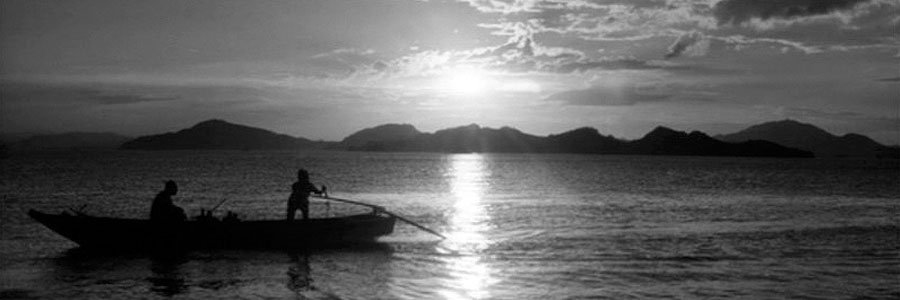
The Naked Island

THE NAKED ISLAND (MOVIE)
Kindai Eiga Kyokai
Original release: November 23rd, 1960
Running time: 96 minutes
Country of origin: Japan
Original language: Japanese
Writer and director: Kaneto Shindo
Cast: Nobuko Otowa, Taiji Tonoyama

When looking at the issue of ‘what I want to be when I grow up’ as a kid, I was very quick to declare that agriculture wasn’t for me. If I remember correctly, there was consensus on this amongst my peers; we generally considered growing things and feeding animals as an inherently boring life.
As a result, agriculture is as far from my life today as it can be. My views however have changed quite a lot in recent years. Farming requires patience, persistence and a certain amount of stoicism; qualities I’ve come to admire and hope to acquire as well. I find these traits to be the key ingredients in getting ahead in life.
This is precisely why I’m glad I didn’t get a chance to see Kaneto Shindo’s The Naked Island until recently. Watching it today, I can appreciate the portrayal of the cycle of life in rural Japan that can only be shown truthfully in a slow-paced film. Although the story has a post-war context in following the daily life and struggles of a Japanese family living on a small island in the Seto Inland Sea, the film doesn’t necessarily need to be linked with the conditions that followed the war. Life can become difficult at times for all of us and that’s where the film speaks on a more personal level to a wider audience.
The Naked Island contains no spoken dialogue; something I expected to feel gimmicky prior to watching, but I was proven wrong. The characters’ silence contributes greatly to the film’s stoic attitude to the hardships of life with very skilfully shot scenes where the lack of spoken words also feels completely natural. This consistent silence mirrors the patience and the hard work farming requires; we can expect no swift results in The Naked Island.

The film does however have a plot of sorts. The monotonous routine is interrupted by a medical emergency, which ends in tragedy as getting a doctor to the island takes too long to save the life of one of the couples’ two young boys. This is when the wife (Nobuko Otowa) breaks down emotionally and begins to question their daily routine. Her husband (Taiji Tonoyama) is portrayed as an excessively cold person throughout, but the true distinction between the two characters becomes even more apparent when he reacts to his son’s death by returning to work right away.
I found the husband’s overtly mean and militaristic attitude unpleasant to watch, but I still couldn’t help but see the beauty in a family working together persistently towards the eventual payoff. There was something inherently satisfying about watching the process.
While cinematic subtext always intrigues me – and much has been written about The Naked Island – I felt the urge to not read too much into the film while watching it. Instead of seeing the island as a metaphor for a post-war Japan devastated by nuclear fallout, I wanted to see it for what it is: the home chosen by a family that  may not be a perfect place to live, but the difficulties the characters face in the film might be familiar to many who never had to be victimised by the after effects of a nuclear blast.
may not be a perfect place to live, but the difficulties the characters face in the film might be familiar to many who never had to be victimised by the after effects of a nuclear blast.
With or without subtext, The Naked Island is a beautifully made film that has a distinguished place in Japanese cinema. The open space, the sea and the surrounding mountains are beautifully captured in black and white; the location for the film is a true visual wonder in high contrast to the difficult and isolated life of the characters.
Only Kaneto Shindo knows why he wrote the male protagonist so cold and distant. Showing a little bit of affection at times of emotional distress can be very powerful, but he’s unwilling to support his wife in that way. Instead of the island or their circumstances, it’s his attitude that creates the isolated and bleak atmosphere for the film. The character’s background is not told, but the middle aged man almost certainly is burdened by memories of the war.
However, one’s negative attitude is always easier to overcome than hardship, which is why I felt that happiness was always within reach but never attained for the family of The Naked Island.

Arpad Lukacs
Arpad is a Film Studies graduate and passionate photographer (he picked up the camera and started taking stills just as he began his studies of moving pictures). He admires directors that can tell a story first of all in images. More or less inevitably, Brian De Palma has become Aprad’s favourite filmmaker.
Then there’s Arpad’s interest in anime. He was just a boy when he saw Nausicaä of the Valley of the Wind on an old VHS and was hypnotised by the story of friendship, devotion and sacrifice. He still marvels at the uncompromising and courageous storytelling in Japanese anime, and wonders about the western audience with its ever growing appetite for “Japanemation”.
Have a look at Arpad's photography site, and you can follow him on Twitter @arpadlukacs.
© 2022 STATIC MASS EMPORIUM . All Rights Reserved. Powered by METATEMPUS | creative.timeless.personal. | DISCLAIMER, TERMS & CONDITIONS
HOME | ABOUT | CONTACT | TWITTER | GOOGLE+ | FACEBOOK | TUMBLR | YOUTUBE | RSS FEED
CINEMA REVIEWS | BLU-RAY & DVD | THE EMPORIUM | DOCUMENTARIES | WORLD CINEMA | CULT MOVIES | INDIAN CINEMA | EARLY CINEMA
MOVIE CLASSICS | DECONSTRUCTING CINEMA | SOUNDTRACKS | INTERVIEWS | THE DIRECTOR’S CHAIR | JAPANESE CINEMA





